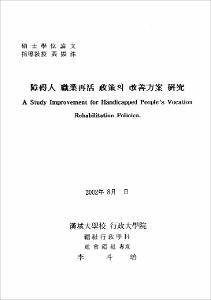障碍人 職業再活 政策의 改善方案 硏究
- Files in This Item:
-
-
Download
 000000066117.pdf
기타 데이터 / 5.02 MB / Adobe PDF
000000066117.pdf
기타 데이터 / 5.02 MB / Adobe PDF
-
Items in Repository are protected by copyright, with all rights reserved, unless otherwise indicated.
 000000066117.pdf
기타 데이터 / 5.02 MB / Adobe PDF
000000066117.pdf
기타 데이터 / 5.02 MB / Adobe PDFItems in Repository are protected by copyright, with all rights reserved, unless otherwise indicated.